The vegan diet, as defined by a 2009 study in the American Journal of Clinical Nutrition by Winston J. Craig from the Department of Nutrition and Wellness at Andrews University, excludes all animal products and by-products, focusing instead on plant-based foods. Vegan diets have grown in popularity over the last decade, especially in European populations.
When asking “Is a vegan diet healthy?”, we can refer to a 2021 systematic review published in Clinical Nutrition. Conducted by researchers from multiple institutions, including the Aristotle University of Thessaloniki and the World Health Organization, the study found that a vegan diet is associated with several health benefits. These benefits include lower serum cholesterol levels and a reduced risk of heart disease. However, the diet also comes with potential risks, such as deficiencies in micronutrients like vitamins B-12 and D, calcium, and omega-3 fatty acids.
According to the review, vegan diets are generally lower in protein intake compared to other diets, with vitamin B12 intake among vegans significantly lower than the recommended 2.4 μg, and most falling below the calcium recommendation of 750 mg per day. However, the study concluded that vegan diets are not related to deficiencies in vitamins A, B1, B6, C, E, iron, phosphorus, magnesium, copper, and folate and have a low glycemic load.
The vegan diet consists of several subtypes, including the raw vegan diet and the keto vegan diet, each with distinct characteristics and nutritional profiles. A 2022 study in Nutrients by Klaus Abraham and colleagues from the Department of Food Safety at the German Federal Institute for Risk Assessment compared strict raw food eaters with other diet groups and found that while raw food eaters had lower mean values of BMI and percentage of body fat, they also had potential deficiencies in protein, calcium, and iodine intake, as well as lower levels of HDL cholesterol, triglycerides, zinc, and vitamin D3.
Therefore, while a vegan diet has several health advantages, individuals following this diet should be aware of the risk of potential dietary deficiencies and may need to take appropriate supplements.
What is a Vegan Diet?
A vegan diet is a plant-based eating pattern that excludes all animal products and by-products, according to a 2022 study published in the Proceedings of the Nutrition Society by Timothy J. Key and colleagues from the Cancer Epidemiology Unit at the University of Oxford. This diet has gained popularity for its ethical, health, and environmental benefits, as outlined in a 2021 review published in the journal Nutrients by scholars from the University of Rome Tor Vergata.
A well-balanced vegan diet can help achieve and maintain optimal health, but it can also lead to deficiencies in key nutrients such as proteins, omega-3 fatty acids, iron, vitamin D, and calcium, especially vitamin B12, as the same 2021 review points out.
In terms of weight loss, a 2015 study published in Eating Behavior by Wendy J. Moore and associates from the University of South Carolina and the University of Akron found that vegan and vegetarian diets may have a greater impact on weight loss and animal product intake than more moderate approaches, even among non-adherent participants.
What is the definition of a healthy Vegan Diet?
A healthy vegan diet is one that is rich in fiber, folic acid, vitamins C and E, potassium, magnesium, and phytochemicals, while also having a fat content that is more unsaturated, as outlined in a 2009 study by Winston J. Craig from the Department of Nutrition and Wellness at Andrews University.
This diet minimizes saturated fats and cholesterol, but it’s crucial to supplement or consume fortified foods to avoid deficiencies in micronutrients such as vitamins B-12 and D, calcium, and long-chain omega-3 fatty acids; attention should also be given to iron and zinc due to their limited bioavailability in plant-based foods.
How does the Vegan Diet work?
The Vegan Diet works by focusing entirely on plant-based foods and excluding all animal products and by-products, as outlined in a study by Dimitra Rafailia Bakaloudi and colleagues from Aristotle University of Thessaloniki and WHO European Office, published in Clinical Nutrition in May 2021.
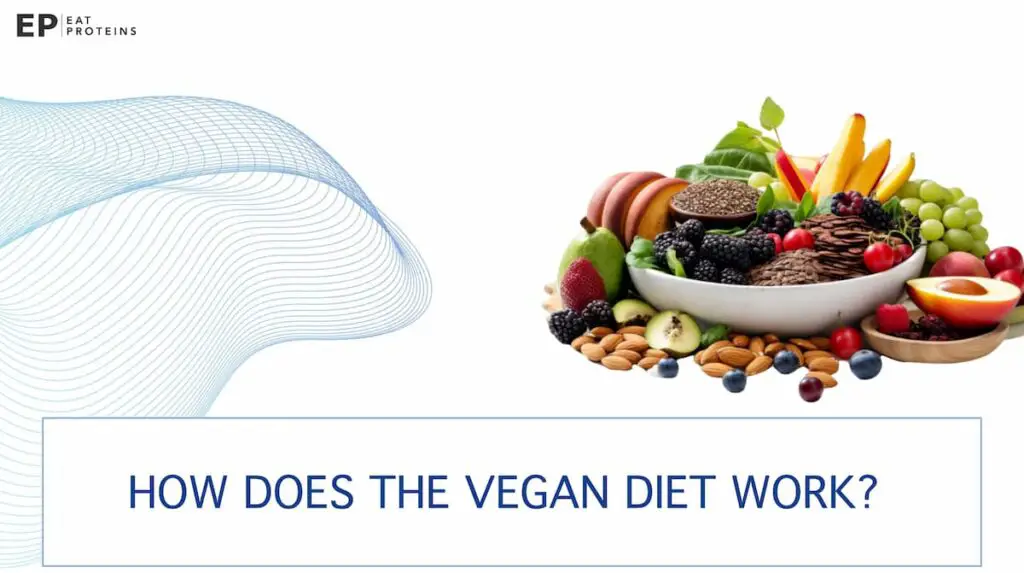
This diet is lower in protein intake compared to other diets, with vitamin B12 intake among vegans found to be significantly lower (0.24-0.49 µg, as opposed to the recommended 2.4 µg), and calcium intake in the majority of vegans below recommendations (750 mg/d). However, it is not associated with deficiencies in vitamins A, B1, B6, C, E, iron, phosphorus, magnesium, copper, and folate, and has a low glycemic load.
Another study conducted by Giulia Marrone and associates from the University of Rome Tor Vergata, published in Nutrients in March 2021, indicates that a well-balanced vegan diet can help in achieving and maintaining an optimal state of health. This diet reduces the risk of developing chronic non-communicable degenerative diseases like metabolic syndrome.
When asking about the long-term effects of a vegan diet, we can refer to a two-year randomized weight loss trial published in the journal Obesity in September 2007. Conducted by Gabrielle M. Turner-McGrievy, Neal D. Barnard, and Anthony R. Scialli from the University of North Carolina, the study showed that individuals following a vegan diet lost more weight than those on the NCEP diet (National Cholesterol Education Program) at both the 1-year and 2-year marks.
How does a Vegan Diet aid in weight loss?
A Vegan Diet can be an effective tool for weight loss, as evidenced by multiple studies. According to a systematic review published in “Diabetes Metab Syndr Obes” in September 2020 by researchers from the University of Bergen and Haukeland University Hospital in Norway, plant-based diets may improve weight status in certain patient groups.
Another study from December 2021 published in “Foods” by the Medical University-Plovdiv in Bulgaria and Université Clermont Auvergne in France showed that vegan diets are associated with improved gut microbiota and increased insulin sensitivity. These diets often have reduced calorie density and lower cholesterol intake, contributing to weight loss.
Moreover, the World Health Organization states that obesity rates have nearly tripled since the 1970s, making effective weight loss strategies crucial. Given these findings, vegan diets could play a significant role in future weight loss strategies.
A Vegan Diet has garnered attention not just in academic circles but also among celebrities like Ariana Grande or Lizzo, who reportedly experienced weight loss after switching to a vegan diet.
What are the pros and cons of a Vegan Diet?
A vegan diet is associated with a reduced risk of developing cardiovascular disease (CVD), diabetes, hypertension, dementia, and cancer, according to a study published in the European Heart Journal in 2023 by researchers from the University of Sydney and Harvard T.H. Chan School of Public Health.
The study also notes that vegan diets have confirmed protective effects for the prevention of diabetes and reductions in weight, blood pressure, and low-density lipoprotein cholesterol. However, the study points out that there are no available data on cardiovascular event rates and cognitive impairment and very limited data for cancer.
On the other hand, a 2009 study published in the American Journal of Clinical Nutrition by Winston J. Craig from Andrews University suggests that while vegans tend to be thinner and have lower serum cholesterol, eliminating all animal products increases the risk of nutritional deficiencies, particularly in vitamins B-12 and D, calcium, and long-chain omega-3 fatty acids. The study recommends that unless vegans consume foods fortified with these nutrients, they should take appropriate supplements.
What are the health benefits of a Vegan Diet?
A vegan diet is associated with a lower risk of cardiovascular diseases, certain types of cancer, and metabolic syndrome, largely due to its high fiber and nutrient content and low saturated fat levels. It also contributes to weight loss and improved body composition, including a reduction in visceral and subfascial fat.
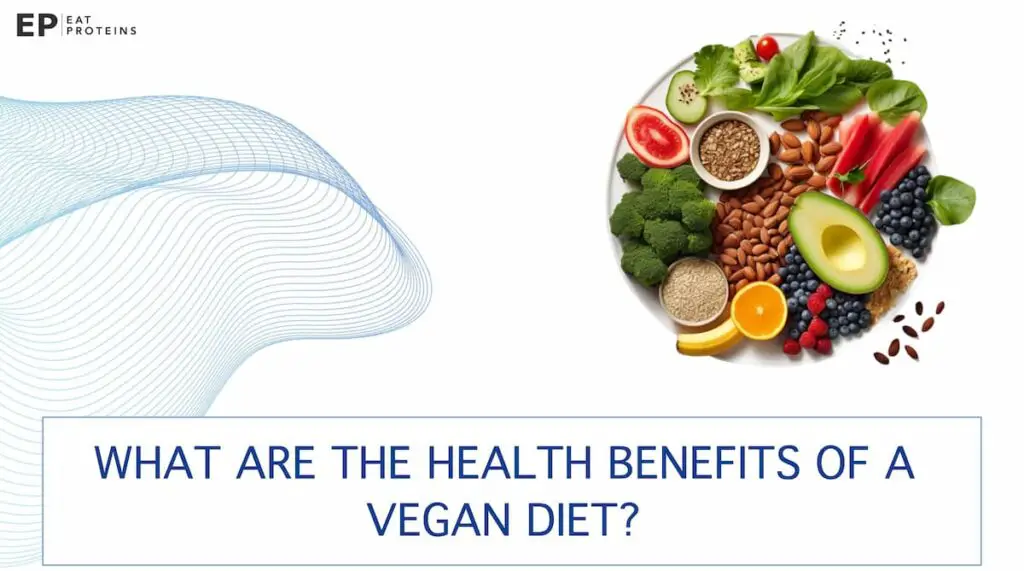
- Cardiovascular Health: A 2003 study by Fraser G and work by Toohey et al. showed that vegans have lower total and LDL cholesterol, contributing to a reduced risk of heart disease.
- Cancer Prevention: According to data from the Adventist Health Study, vegans have a considerably reduced risk of colorectal and prostate cancer compared to non-vegetarians.
- Lower Risk of Metabolic Syndrome: A 2007 study by Luigi Fontana from Washington University School of Medicine found that a vegan diet improves fasting blood glucose and lipid profiles, thus reducing risks associated with metabolic diseases.
- Improve Bone Health: Though there’s some debate, the EPIC-Oxford study indicated no significant difference in bone fracture rates between vegans who consumed adequate calcium and omnivores.
- Improve Body Composition: A 2006 research by Susan E. Berkow and a 2015 meta-analysis by Neal D. Barnard published in the Journal of the Academy of Nutrition and Dietetics showed that a vegan diet is associated with an average body weight reduction of 3.4 to 4.6 kg, particularly reducing visceral fat.
- Improve Lipid Profile: A study among Latin Americans showed that plasma total and LDL cholesterol were 32% and 44% lower among vegans than among omnivores.
- Lower BMI: Vegans typically have a lower body mass index (BMI), which is an important factor for reducing the risk of various diseases, including cancer.
- Reduce Risk of Stroke: Higher consumption of fruits and vegetables in a vegan diet is associated with a lower risk of mortality from stroke and ischemic heart disease.
What are the health risks of a Vegan Diet?
The health risks of a Vegan Diet primarily revolve around potential nutrient deficiencies, including those of vitamin B-12, iron, vitamin D, zinc, and omega-3 fatty acids. Proper planning and fortification can mitigate these risks, but they are significant concerns nonetheless.
- Omega-3 Fatty Acids (n-3 Polyunsaturated fat): Diets lacking in fish or sea vegetables generally fall short in long-chain n-3 fatty acids like EPA and DHA, essential for cardiovascular and brain health. Studies indicate that vegans tend to have lower blood concentrations of these fatty acids.
- Vitamin D: Vegans had the lowest mean intake of Vitamin D at 0.88 μg/d, as per the EPIC-Oxford study. Living at high latitudes or having dark skin increases the risk of deficiency.
- Iron: While hemoglobin concentrations may be similar between vegans and omnivores, serum ferritin concentrations can be lower in some vegans, according to Craig Winston J from Andrews University.
- Vitamin B-12: Vegans typically have lower plasma vitamin B-12 concentrations and a higher prevalence of vitamin B-12 deficiency. Elevated levels of homocysteine, a risk factor for CVD, have been observed in those with B-12 deficiency.
- Zinc: The bioavailability of zinc in a vegan diet can be compromised due to the presence of phytates in grains and legumes. However, a sensitive marker to measure zinc status has not been well-established.
How to start a Vegan Diet plan
To start a Vegan Diet plan, follow these nine definitive instructions, informed by studies like the one from the Division of Geriatrics and Nutritional Sciences and Center for Human Nutrition at Washington University School of Medicine.
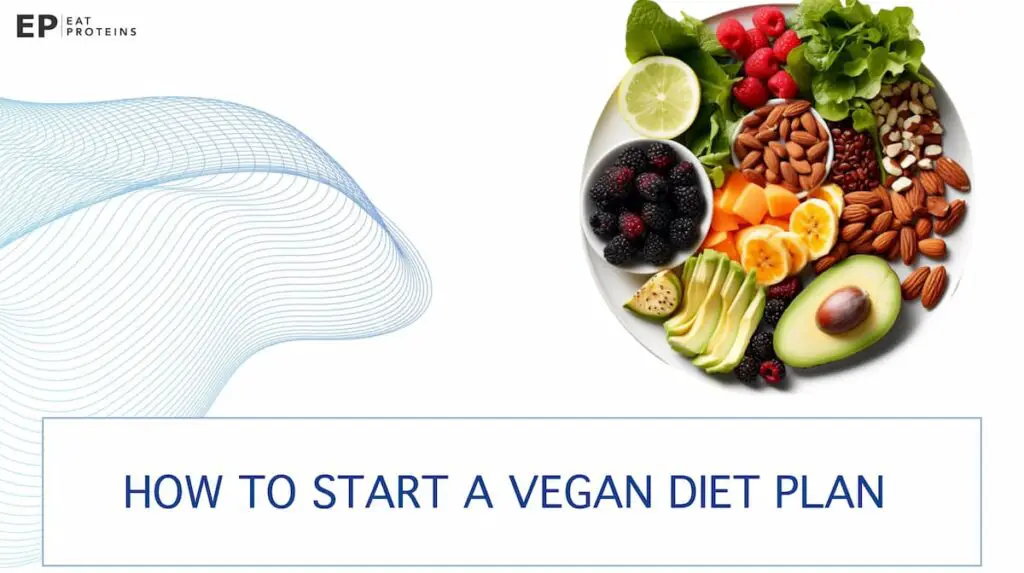
- Begin by incorporating vitamin B-12–fortified foods like fortified soy and rice beverages, certain breakfast cereals, and B-12–fortified nutritional yeast into your diet daily.
- Add calcium-fortified foods like ready-to-eat cereals, calcium-fortified soy, and rice beverages, and calcium-fortified juices to your diet.
- Aim to consume these alongside traditional vegan calcium sources like green leafy vegetables, tofu, and tahini.
- Especially during winter, ensure you’re consuming vitamin D–fortified foods such as soy milk, rice milk, orange juice, and fortified cereals. If these are unavailable, take a daily supplement of 5–10 μg vitamin D.
- Regularly consume plant foods rich in the n-3 fatty acid ALA like ground flaxseed, walnuts, canola oil, and soy products.
- Opt for foods fortified with long-chain n-3 fatty acid DHA, such as some soy milk and cereal bars. If you are pregnant or lactating, consider taking DHA-rich microalgae supplements.
- Due to the high phytate content in a typical vegan diet, include foods rich in zinc such as whole grains, legumes, and soy products.
- For adequate protein, aim to include at least 50 grams of plant-based proteins like lentils, chickpeas, and quinoa daily, as suggested by the American Dietetic Association.
- On the 1st and 15th of each month, plan a two-week menu to ensure you’re meeting all nutritional needs.
- Utilize apps or consult registered dietitians specializing in vegan nutrition for better planning.
- After the first three months, consider doing a nutrient assessment through a healthcare provider.
- Make necessary adjustments based on the feedback to ensure optimal health.
What is the grocery list for someone starting a vegan diet?
A grocery list for someone starting a vegan diet should focus on a variety of plant-based foods that cover essential nutrients. This includes protein-rich legumes, fortified plant-based milks for calcium and vitamin D, whole grains for fiber and energy, and a colorful array of fruits and vegetables for other vitamins and minerals.
- Fruits: Bananas, apples, oranges, berries
- Vegetables: Spinach, kale, bell peppers, carrots
- Legumes: Lentils, chickpeas, black beans
- Nuts and Seeds: Almonds, walnuts, chia seeds, flaxseed
- Whole Grains: Brown rice, quinoa, whole grain pasta
- Fortified Plant Milk: Almond milk, soy milk (fortified with calcium and vitamin D)
- Fortified Cereals: Whole grain cereals fortified with B12 and iron
- Plant-Based Proteins: Tofu, tempeh, seitan
- Healthy Fats: Avocado, olive oil
- Snacks: Vegan crackers, fruit bars
- Herbs and Spices: Basil, oregano, turmeric
- Supplements: Vitamin B12, Vitamin D (if fortified foods are insufficient)
What foods can you eat on the Vegan Diet?
On a vegan diet, you can eat a wide range of plant-based foods that are rich in nutrients, fiber, and flavor. This includes various fruits and vegetables, grains, legumes, nuts, seeds, and plant-based protein sources, among other items.
What foods are restricted on the Vegan Diet?
On a vegan diet, all animal-based foods and by-products are restricted, which means avoiding meat, dairy, eggs, and other items derived from animals. This includes certain processed foods that may contain hidden animal-derived ingredients.
- Meat: Beef, chicken, pork, lamb
- Seafood: Fish, shrimp, crab
- Dairy: Milk, cheese, yogurt, butter
- Eggs: Whole eggs, egg whites
- Animal Fats: Lard, tallow
- Gelatin: Found in certain candies, marshmallows, and jellies
- Honey: Bee-derived sweetener
- Processed Foods: Certain cookies, snacks, and cereals containing milk derivatives
- Additives: Certain food colorings and additives like E120 (carmine)
- Broths: Chicken, beef, or fish-based broths
- Whey and Casein: Milk-derived proteins found in some processed foods
- Collagen: Derived from animal skin and bones, found in some beauty products and supplements
- Hidden Ingredients: Look for “contains milk” or “contains eggs” on labels of processed foods
What is included in the Vegan Diet meal plan?
A vegan diet meal plan includes a diverse range of plant-based foods, beverages, and snacks that provide essential nutrients, vitamins, and minerals. The plan typically focuses on whole foods, fortified items, and a variety of protein sources to ensure balanced nutrition.
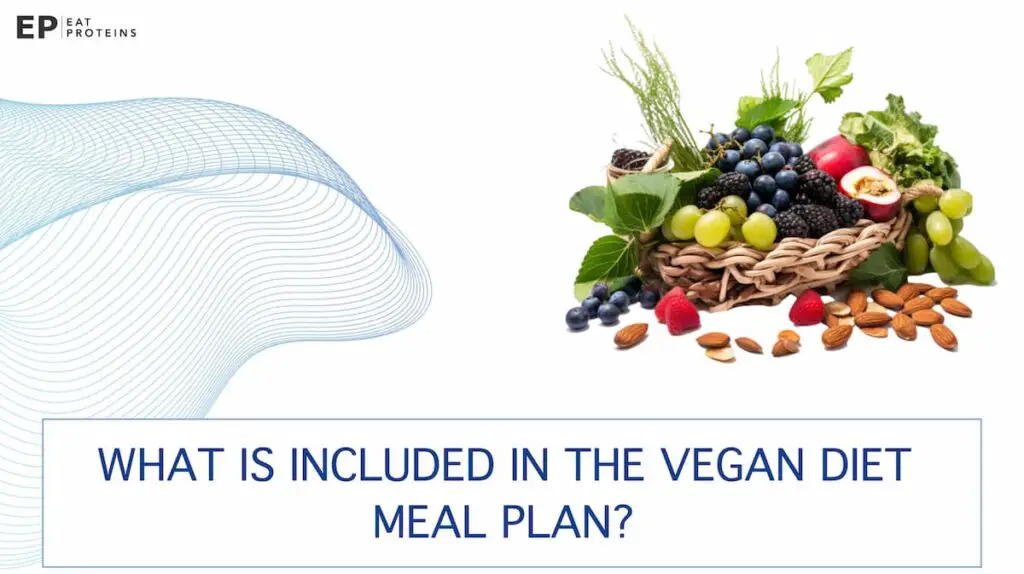
- Breakfast Vegan Foods: Overnight oats with almond milk, chia seeds, and fresh berries; whole-grain toast with avocado
- Lunch Vegan Foods: Lentil soup, quinoa salad with mixed vegetables, chickpea “tuna” salad
- Dinner Vegan Foods: Stir-fried tofu with broccoli and brown rice, spaghetti with plant-based meatballs, vegetable curry with lentils
- Vegan Snacks: Rice cakes with almond butter, fresh fruit slices, roasted chickpeas
- Vegan Beverages: Green smoothies, herbal teas, fortified plant-based milks (soy, oat, almond)
- Vegan Desserts: Vegan chocolate chip cookies, fruit sorbet, dark chocolate (check for milk ingredients)
- Vegan Condiments: Vegan mayonnaise, hummus, salsa
- Vegan Herbs and Spices: Fresh basil, mint, nutritional yeast for a cheesy flavor
- Vegan Supplements: Vitamin B12, Omega-3 from algal oil, vitamin D supplement if needed
- Other Vegan Items: Plant-based yogurt, vegan cheese, seitan sausages
What is the 7-day Vegan meal plan?
A 7-day vegan meal plan incorporates a balanced selection of plant-based foods to ensure you get essential nutrients, vitamins, and minerals each day. This plan offers variety in terms of meals, beverages, and snacks to keep your diet interesting and nutritionally sound.
Day 1
- Breakfast: Overnight oats with coconut milk, flaxseeds, and blueberries
- Lunch: Chickpea salad with lots of veggies and tahini dressing
- Dinner: Lentil curry with brown rice
- Snacks: Apple slices, carrot sticks
- Beverages: Green tea, water
Day 2
- Breakfast: Smoothie with spinach, banana, almond milk, and chia seeds
- Lunch: Avocado toast on whole-grain bread, side of fruit
- Dinner: Vegan stir-fry with tofu and quinoa
- Snacks: Rice cakes, almonds
- Beverages: Herbal tea, fortified orange juice
Day 3
- Breakfast: Vegan pancakes with fresh berries
- Lunch: Black bean and corn salad
- Dinner: Vegetable sushi rolls with miso soup
- Snacks: Dried apricots, celery sticks
- Beverages: Coconut water, almond milk
Day 4
- Breakfast: Chia pudding with mango and kiwi
- Lunch: Falafel wrap with hummus and vegetables
- Dinner: Stuffed bell peppers with wild rice and black beans
- Snacks: Vegan chocolate chip cookies, walnuts
- Beverages: Lemonade, water
Day 5
- Breakfast: Whole-grain toast with avocado and tomato slices
- Lunch: Cauliflower and potato curry with naan bread
- Dinner: Vegan pizza with your favorite plant-based toppings
- Snacks: Fresh grapes, rice cakes
- Beverages: Green smoothie, herbal tea
Day 6
- Breakfast: Acai bowl with mixed fruit and granola
- Lunch: Vegan burger with sweet potato fries
- Dinner: Spaghetti squash with vegan meatballs
- Snacks: Cherry tomatoes, dark chocolate
- Beverages: Water, fortified soy milk
Day 7
- Breakfast: Vegan scramble made with tofu, spinach, and mushrooms
- Lunch: Vegetable stew with a side of whole-grain bread
- Dinner: Vegan tacos with lettuce, tomato, vegan cheese, and guacamole
- Snacks: Sliced cucumber, vegan yogurt
- Beverages: Black coffee, water
What are the best Vegan Diet snack options?
The best vegan diet snack options include vegan flapjacks, curried cashew dip, protein balls, hummus snack packs, spicy microwave popcorn, spicy sweet potato hummus, courgette pakoras, and hummus with pickled red onion & pomegranate seeds.
How many calories should you eat on a Vegan Diet?
On a vegan diet, the total energy intake typically ranges between 1,672 and 2,055 calories per day, meeting the WHO recommendations. The primary sources of energy for vegans are carbohydrates and soy proteins.
How many carbs should you eat on a Vegan Diet?
Carbohydrates should make up about 45–65% of total daily calories in a balanced vegan diet. This ensures you get enough energy while adhering to a plant-based eating plan.
How much protein should you eat on a Vegan Diet?
You should eat between 80 to 120 grams of proteins per day on the Vegan diet.
How can you get more proteins on a Vegan Diet?
Protein adequacy in a vegan diet can be achieved by consuming protein-rich foods like traditional legumes, nuts, and seeds.
What are the best recipes for the Vegan Diet?
The best recipes for the Vegan Diet can be found in Love and Lemons’ collection of 85 vegan recipes.
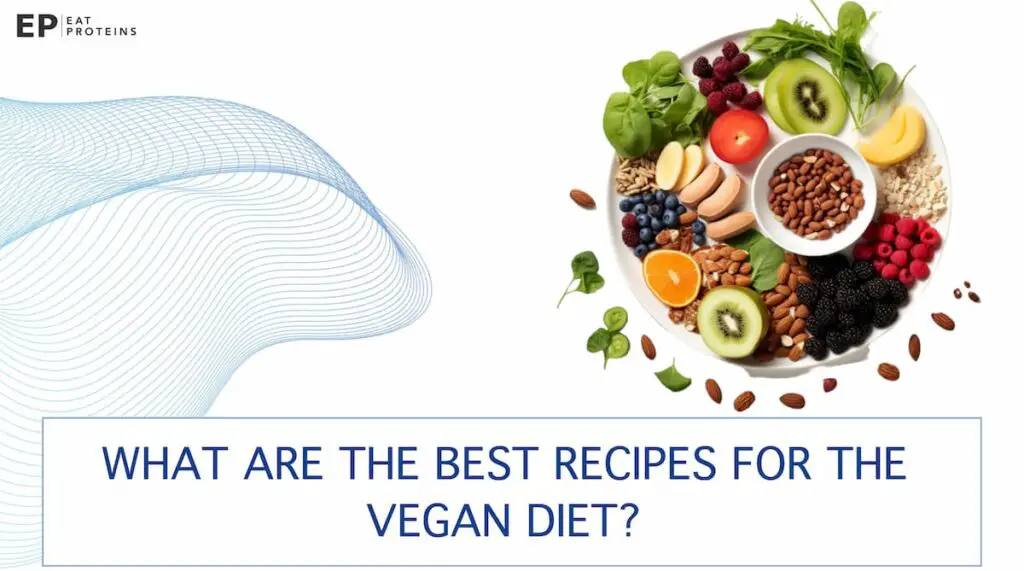
From creamy pasta to hearty stews, tacos to sushi, and burgers to salads, these recipes cater to all tastes and dietary needs. With a focus on vegetables and plant-based ingredients, these recipes are perfect for both longtime vegans and those new to a plant-based diet.
How easy is it to cook your own Vegan meals at home?
Cooking your own vegan meals at home is easy with the wide variety of vegan recipes available. With a little planning and preparation, you can create tasty and nutritious vegan dishes in the comfort of your kitchen.
What are the best recipe cookbooks for the Vegan Diet?
The three best recipe cookbooks for the Vegan Diet are “The Complete Plant-Based Cookbook: 500 Inspired, Flexible Recipes for Eating Well Without Meat” published in 2020, “BOSH!” by Ian Theasby released in 2018, and “Vegetable Kingdom” by Bryant Terry, published in 2020.
These vegan diet cookbooks are highly recommended for their variety, culinary creativity, and focus on plant-based ingredients. Each offers a unique approach to vegan cooking, providing both beginner and experienced cooks with a wealth of recipes to try.
What are the best apps for the Vegan Diet?
The best apps for a vegan diet include the following.
- 21-Day Vegan Kickstart: This vegan diet app for those new to veganism, offering a structured three-week plan to ease into the lifestyle
- HappyCow – Find Vegan Food: This is excellent for locating vegan-friendly restaurants and stores, making dining out and shopping easier.
- Dr. Greger’s Daily Dozen: This app helps you track essential foods and nutrients to ensure you’re meeting your dietary requirements.
What are the best meal delivery services for the Vegan Diet?
The best meal delivery services for a vegan diet include the following.
- Clean Eatz Kitchen offers a variety of certified organic vegan meals that are easy to prepare.
- HelloFresh provides a plant-based menu option with diverse and flavorful recipes to keep your diet interesting.
- Factor Meals specializes in providing pre-made gourmet vegan meals, focusing on nutritional balance and convenience.
What are the best vegan-friendly restaurants?
The best vegan-friendly restaurants include “Veggie Grill,” known for its extensive menu of plant-based comfort food, and “Loving Hut,” which offers a variety of international vegan dishes.
- Veggie Grill
- Native Foods
- Plant Power Fast Food
- Next Level Burger
- Loving Hut
- Slutty Vegan
- HipCityVeg
- Ike’s Love and Sandwiches
- Cinnaholic
Are cheat days allowed in a Vegan Diet?
No, cheat days are generally not recommended in a vegan diet, as they can disrupt the ethical and nutritional foundation of veganism. However, individual choices may vary, and some may opt for occasional exceptions based on personal preferences or nutritional needs.
Is alcohol allowed on the Vegan Diet?
Yes, alcohol can be included in a vegan diet, but it’s important to check that the specific brand and type of alcohol is vegan-friendly, as some alcoholic beverages may contain animal by-products or use them in the production process.
What are the different types of Vegan Diets?
The 15 different types of vegan diets include the following.
- Raw vegan diet
- Alkaline vegan diet
- Bodybuilder vegan diet
- Vegan keto diet
- Low-carb vegan diet
- Vegan Mediterranean diet
- High-protein vegan diet
- Vegan diabetic diet
- Anti-inflammatory vegan diet
- Low-fat vegan diet
- Vegan athlete diet
- PCOS vegan diet
- Gluten-free vegan diet
- Paleo vegan diet
- Low FODMAP vegan diet
1. Raw Vegan Diet
Also known as the “live food” diet, the Raw Vegan Diet consists solely of unprocessed plant foods that haven’t been heated above 115°F. A major pro is the diet’s high content of fresh fruits and vegetables, which are rich in nutrients and enzymes. However, a significant downside is the risk of bacterial contamination and nutrient deficiencies, particularly B12 and protein.
2. Alkaline Vegan Diet
The alkaline vegan diet, sometimes called the “alkaline ash” diet, focuses on consuming alkaline-forming foods to balance the body’s pH levels. While it’s praised for its detoxification effects, there’s little scientific evidence to support these claims. Additionally, the diet risks being deficient in essential nutrients like proteins and fatty acids.
3. Bodybuilder Vegan Diet
The bodybuilder vegan diet is engineered for muscle growth and repair, emphasizing high-protein plant-based foods. Its primary advantage is ethical muscle building without animal products. However, it can be challenging to meet the high protein requirements solely from plant sources.
4. Vegan Keto Diet
The vegan keto diet is a plant-based version of the ketogenic diet, focusing on high-fat, low-carb foods. Pros include potential weight loss and blood sugar control, but cons include the risk of nutrient deficiencies.
5. Low-Carb Vegan Diet
The low-carb vegan diet minimizes carbohydrate intake while maximizing plant-based proteins and fats. It offers the potential for weight loss and improved blood sugar levels. However, the risk lies in possible nutrient deficiencies, especially if the diet is not well-planned.
6. Vegan Mediterranean Diet
The vegan Mediterranean diet incorporates the plant-based foods commonly consumed in the Mediterranean region. It is rich in fiber and essential nutrients, making it a generally healthy option. A drawback might be the occasional inclusion of specialty items that are expensive or difficult to find.
7. High-Protein Vegan Diet
The high-protein vegan diet is focused on maximizing protein intake through plant-based sources. It’s beneficial for muscle maintenance and satiety. Yet, it may require careful planning to meet protein needs adequately without animal sources.
8. Vegan Diabetic Diet
The vegan diabetic diet is tailored to manage blood sugar levels through plant-based foods. Pros include better blood sugar control and weight management, but a con is a requirement for careful meal planning.
9. Anti-Inflammatory Vegan Diet
The anti-inflammatory vegan diet is composed of plant foods known to combat inflammation in the body. Benefits may include reduced inflammation and related health improvements. The downside is that it may require the exclusion of some food groups, thereby risking nutrient deficiencies.
10. Low-Fat Vegan Diet
The low-fat vegan diet prioritizes plant foods that are low in fats. It’s beneficial for weight loss and lowering cholesterol levels. On the flip side, a poorly planned low-fat vegan diet could lead to nutrient deficiencies.
11. Vegan Athlete Diet
The vegan athlete diet is tailored to meet the high nutritional demands of athletes, focusing on balanced protein and carbohydrate intake. It offers an ethical and sustainable way to fuel athletic performance. The challenge lies in the need for precise meal planning to meet energy and nutrient demands.
12. PCOS Vegan Diet
The PCOS vegan diet aims to help manage Polycystic Ovary Syndrome (PCOS), this diet focuses on low-glycemic plant foods. Benefits include potential symptom relief and easier weight management. However, individualized planning is crucial to meet specific nutritional needs.
13. Gluten-Free Vegan Diet
The gluten-free vegan diet excludes all animal products along with gluten-containing grains. It’s suitable for those with both vegan dietary choices and gluten sensitivities. However, the diet could be deficient in certain nutrients if not carefully planned.
14. Paleo Vegan Diet
The paleo vegan diet, also known as the Pegan diet, combines aspects of both the paleo and vegan diets. It may offer benefits like weight loss and reduced inflammation. However, the diet’s restrictive nature can make it difficult to sustain and risks nutrient deficiencies.
15. Low FODMAP Vegan Diet:
The low FODMAP vegan diet eliminates certain carbohydrates that are difficult to digest, known as FODMAPs. It may provide relief from gastrointestinal issues like IBS. The complexity of the diet, however, demands careful planning and may risk nutrient deficiencies.
What foods are included in an alkaline vegan diet?
An alkaline vegan diet focuses on consuming alkaline-promoting foods like fruits, vegetables, soybeans, tofu, and some nuts, seeds, and legumes. Dairy, eggs, meat, most grains, and processed foods are excluded as they are considered acidic rather than alkaline.
How can a vegan bodybuilder meet protein needs?
A vegan bodybuilder can meet protein needs by focusing on high-protein plant foods such as seitan, tofu, legumes, and quinoa, and may also utilize vegan protein powders for concentrated protein sources. It’s also crucial to consume enough fats for caloric needs and to drink plenty of fluids to handle the high fiber intake typical in a vegan diet.
How does a keto vegan diet differ from a regular keto diet?
A keto vegan diet differs from a regular ketogenic diet in the source of nutrients; it includes non-starchy vegetables, avocados, nuts, seeds, coconut, and vegan protein sources while avoiding all animal-derived products. This makes it plant-based but still focused on high-fat, low-carb foods.
How do vegan and vegetarian diets compare?
Vegan and vegetarian diets both exclude meat, but a vegetarian diet may still include animal-derived products like eggs and dairy. In contrast, a vegan diet excludes all animal products, including eggs, and dairy, and often extends to other non-food animal products as well.
What are the reviews about a Vegan Diet?
The reviews about a Vegan Diet are varied. Some people praise it for its health benefits, ethical considerations, and positive impact on the environment. Others express concerns about potential nutrient deficiencies and challenges in maintaining a balanced diet. It is important to carefully consider individual needs and consult with a healthcare professional when considering a vegan diet.
What are the success stories of people who follow a vegan diet?
The success stories of people who follow a vegan diet include incredible weight loss transformations, improved health conditions such as diabetes and multiple sclerosis, and a renewed sense of vitality and well-being. These individuals have experienced significant positive changes in their lives by adopting a plant-based lifestyle, showcasing the power of a vegan diet in promoting overall health and healing.
Are there any famous people known for following a Vegan Diet?
Yes, there are many famous people known for following a vegan diet, as evidenced by the list of 60 vegan celebrities in 2023 who share why they chose to go vegan. These celebrities include Moby, Billie Eilish, Rainn Wilson, Stevie Wonder, Elliot Page, Lewis Hamilton, Rooney Mara, Ricky Gervais, Pamela Anderson, Alan Cummings, Sia Furler, Peter Dinklage, and many more.
How does a vegan diet differ from other popular diets?
A vegan diet is distinct in that it excludes all animal products, including meat, dairy, and eggs, focusing instead on plant-based foods like fruits, vegetables, grains, nuts, and legumes. This is in contrast to other popular diets like the ketogenic diet, which emphasizes high-fat and low-carb intake, or the Mediterranean diet, which includes fish and dairy. The vegan diet is not just a set of nutritional guidelines but often aligns with ethical beliefs about animal welfare and environmental sustainability.
